 Al.Admin
Al.Admin
- Posts : 918
Join date : 2020-03-24
Age : 76
Location : Newcastle. N.E England
 My way with roll cages
My way with roll cages
Mon Jun 22, 2020 5:57 am
I want to share with you how I set about scratch building a roll cage.
Others will have their own opinions, this is just how I do it.
I think the first thing to say is this:
DON'T worry if everything isn't perfectly square. I used to go to great pains to do so but soon realised that once inside a tin top, most slight 'misalignments' are so hard to see, it's just not worth the stress to get them perfect.
And the second thing is, CHECK, CHECK and RE-CHECK at every stage. It's normal for me to have the chassis in and out of the body 4 or 5 dozen times during construction
So here we go.
First I mock up the interior, holding the door cards and dash in place with a little MEK.

Now mark the rear hoop mounting points and drill suitable size holes all the way through the floor.

Next mark the positions of the front points, at the rear of the drill.
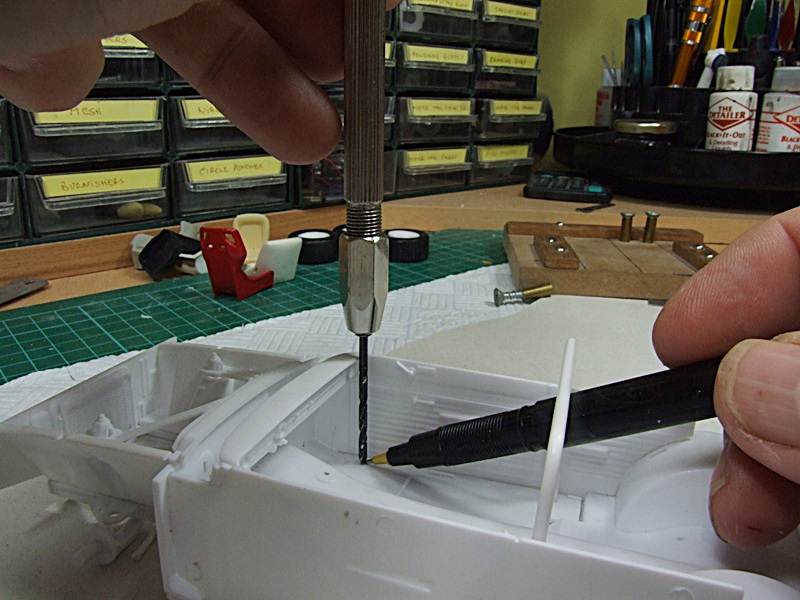
Make an adjustment for the drill width and and again drill all the way through the floor. This gives us a footprint from which to build.
At this point I want to show you a little 'bender' I made up years ago. Construction shoud be self explanatory. It is a great aid in bending styrene, particularly in getting the radius's the same.

Now we need to create the main hoop. Cut a length of rod, more than you will need. (Width of the cage plus twice the height, plus about 24mm extra.) Mark the centre point.
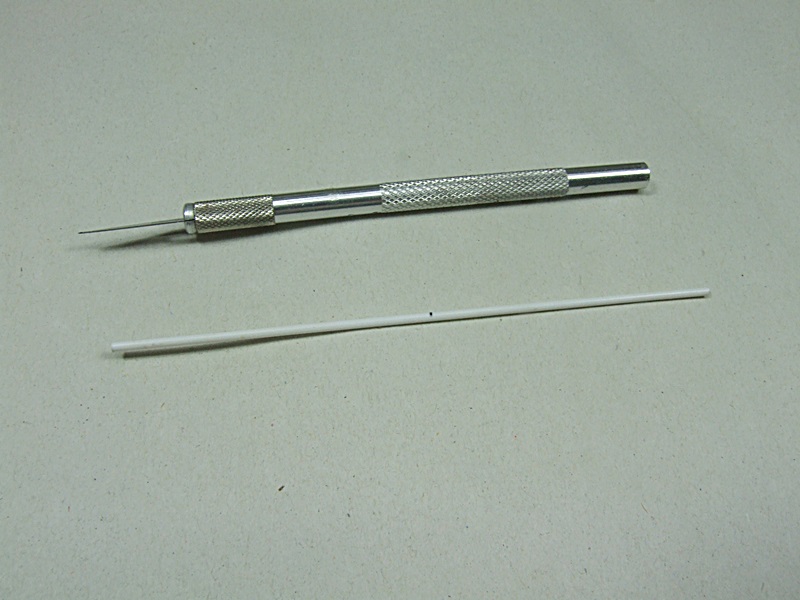
Now measure the spacing of the rear set of holes. Do this centre to centre, left side to left side or right side to right side. It doesn't matter. Here you see I'm doing it centre to centre.

Now using the centre mark on the styrene, mark the centre points of the main hoop on the styrene rod.
Now place the rod in the bender. Note I have marked the centre point of the brass tube the better to line up the marks on the styrene.

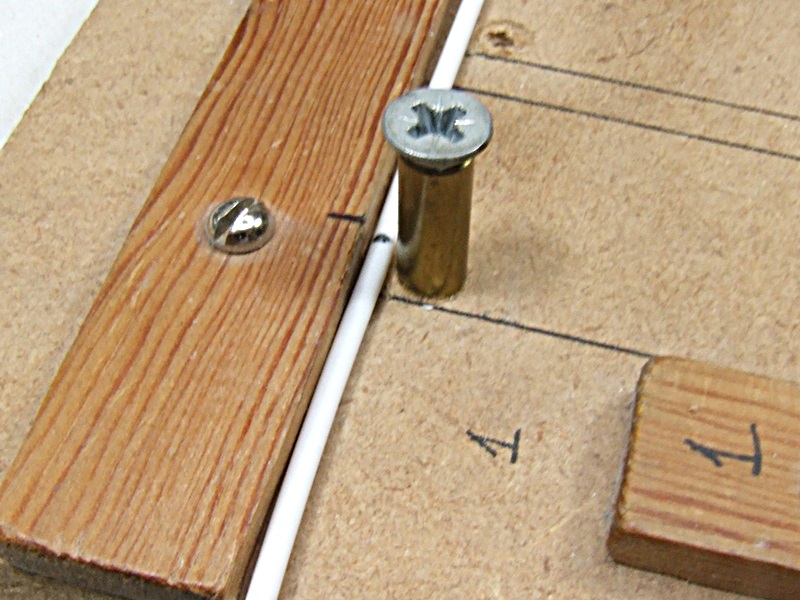
Now hold the styrene in place and slowly bend past the 90 degree point. Well past it actuualy as it will try to regain it's original shape. Don't worry if it's not quite at 90 degrees.
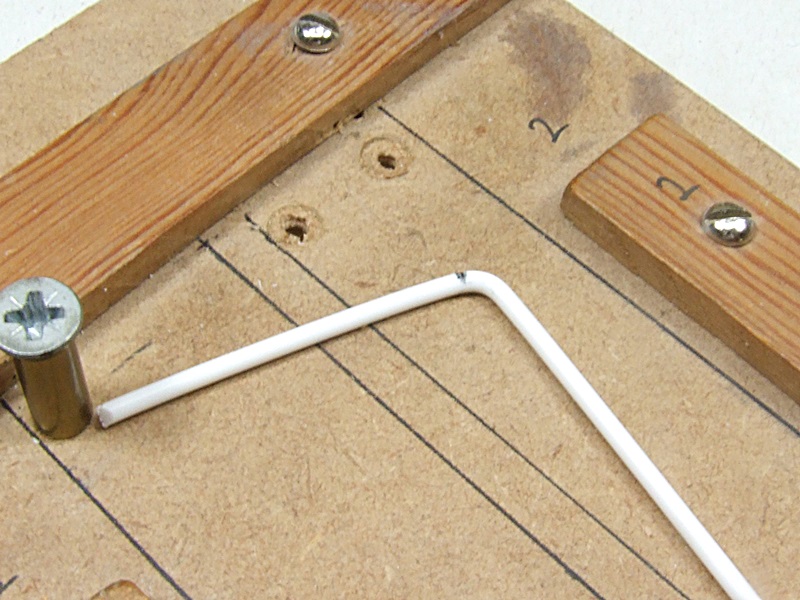
Then repeat for the other side. That's the tricky bit!! LOL.

Next insert the hoop into the holes pushing it well through the holes.



Now we need to turn our attention to the side bars.
With the body fitted, push a length of styrene through a front hole, making sure you have about 12mm poking through, and mark the bend point as shown. Make the bend at the same angle as the A pillar.

Place the styrene back in the hole and mark the second bend point.

Then make the bend. Repeat for the other side.
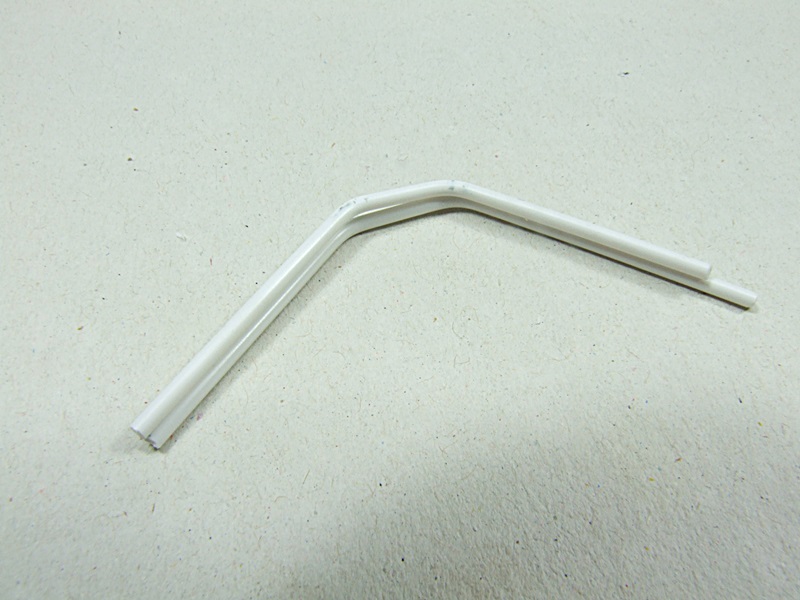
Place both back in the holes and mark the hoop attachment points cutting a tad longer than needed.
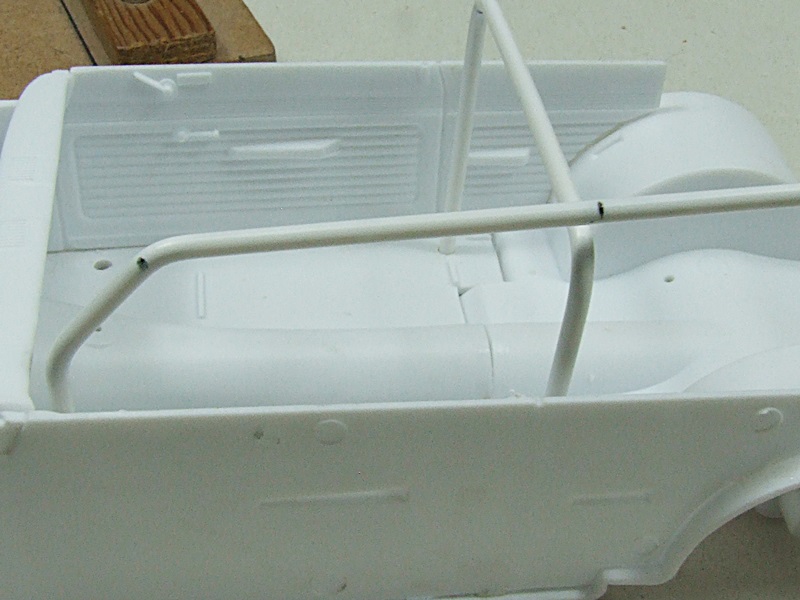
Now we need to make the 'welded joint'.
Just placing a square cut edge against the hoop, will work, but doesn't look good. We need a curve to the styrene just as in the real deal. To do this I made a little jig from mild steel. Again self explanatory as to contruction I think.

Place one of the side bar ends into the 'jig'. It needs to be the end that butts up against the main hoop. Make sure you have it aligned properly, so the the curve will fit properly to the main hoop.
Keep some pressure on the side bar while filing with the rat tailed file. Work slowly, a little at a time. It's easy to over do it.

It should come out a little like this. DON'T clean up the raggy edges. They will help fill any gap while fixing with MEK. My 'jig' is a bit worn now so this one is a little off centre. Don't worry about it though. It isn't THAT critical.
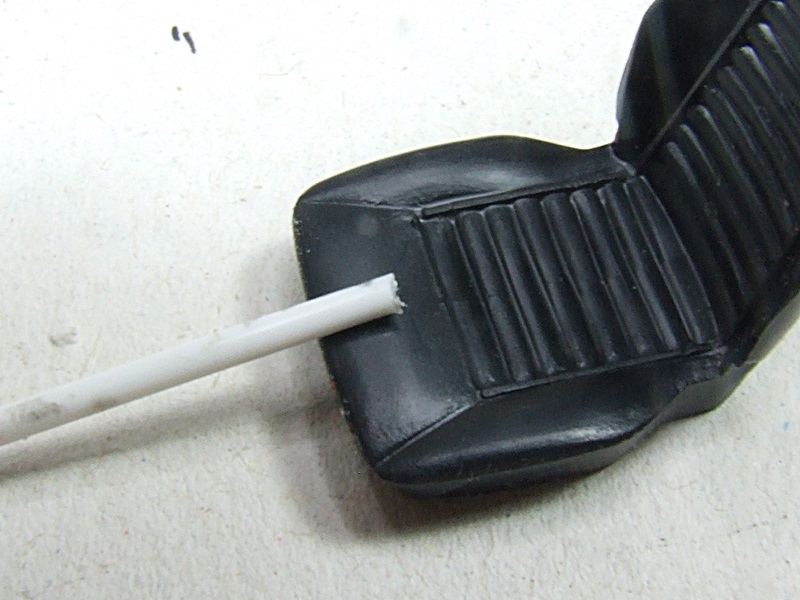
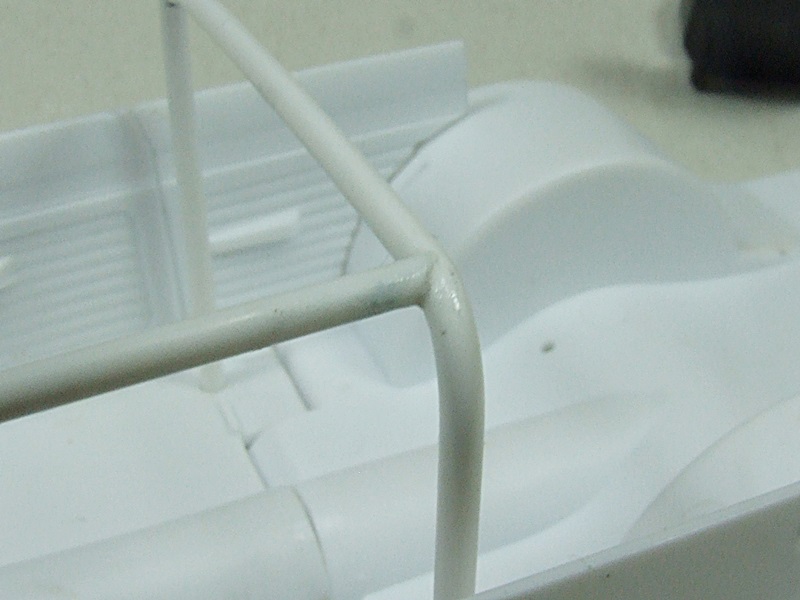
When you have the side bar finished, fit it into the forward hole and secure to the main hoop with MEK. Repeat for the other side.

Now we need to fit the top forward section. Measure a little long and make the curve at each end as above. Once happy with it, secure with MEK as before.
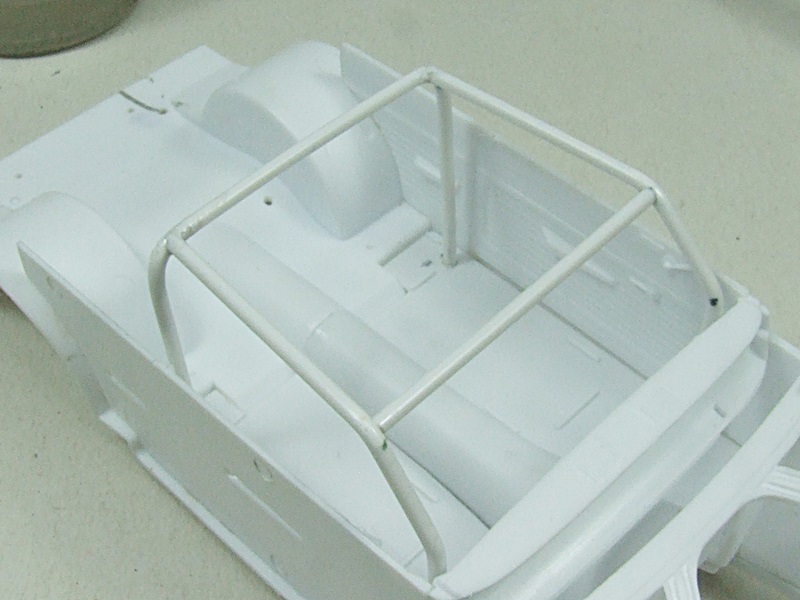
In the same manner, the main hoop cross brace is made. However, getting the curves and angles is a bit more tricky. They need to be at about 45ish degrees so I usualy do them free hand.
I forgot to take a photo of this step but I have indicated where it fits in this photo. Remember, the upper securing point is on the drivers side.
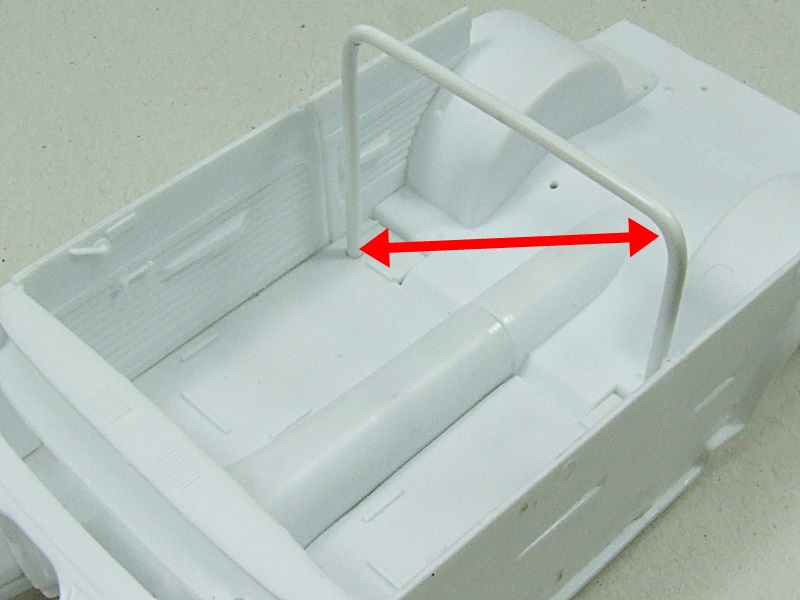
Now break apart the dash, door card and the cage. If you only used a tiny bit of MEK, this won't be difficult.
Now your cage should look something like this.
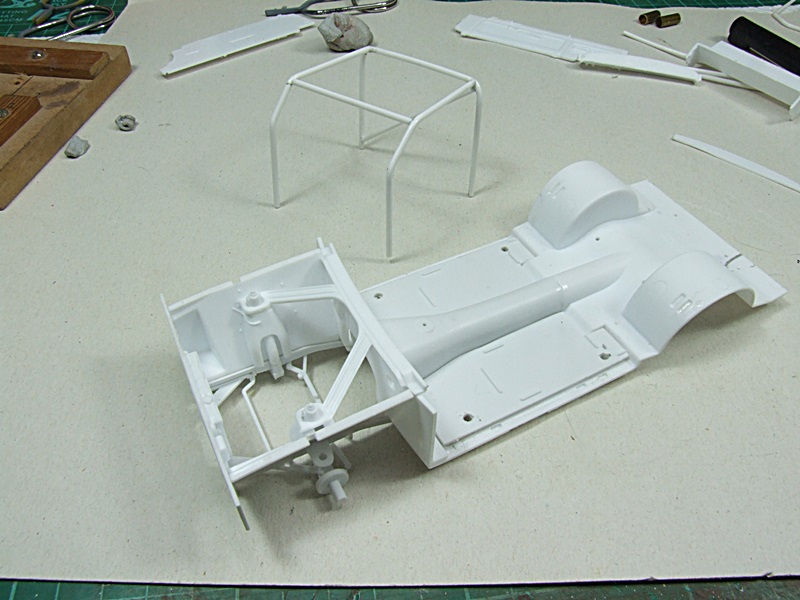
Clean up the bottoms of the cage legs and the holes in the floor. Place the cage back in the holes and press down so that about 25mm pokes out the underside of the floor.
Next fit the window glass in place. This is important as it may well affect the final position of the roll cage. Here you can see that this one is of the one piece type and will definitley affect the final height of the cage.

Now fit the chassis/floor to the body with the hoop in place, then push the cage up into the interior until it touches the roof or it's where you want it and mark the length on the underside, as can be seen in the last photo. Cut to length.
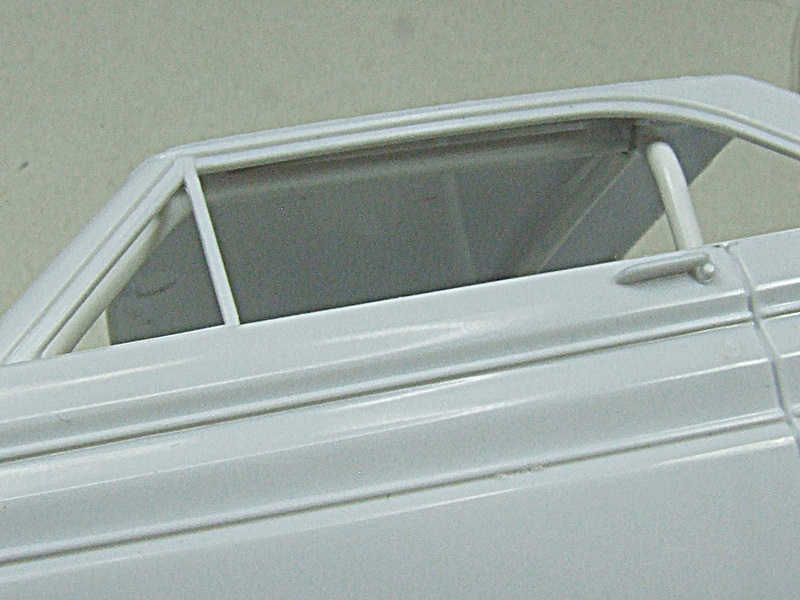
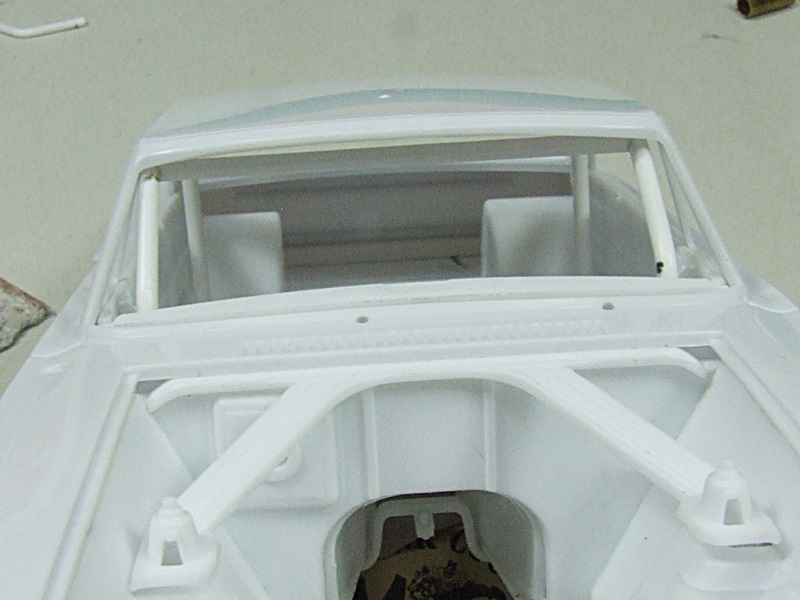

When you have made the cuts and are happy with the postition of the hoop, tack it in place with a tiny drop of MEK. Just a tiny bit, as it will need to come out again later.
With the door cards removed we now have easy access for the side impact bars. Pretty simple on this build and done in the same way as the hoop cross brace.
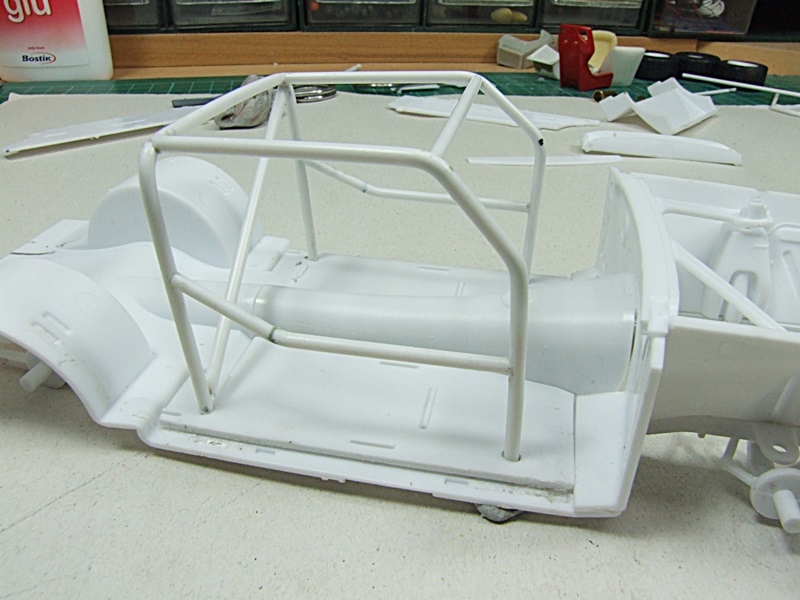
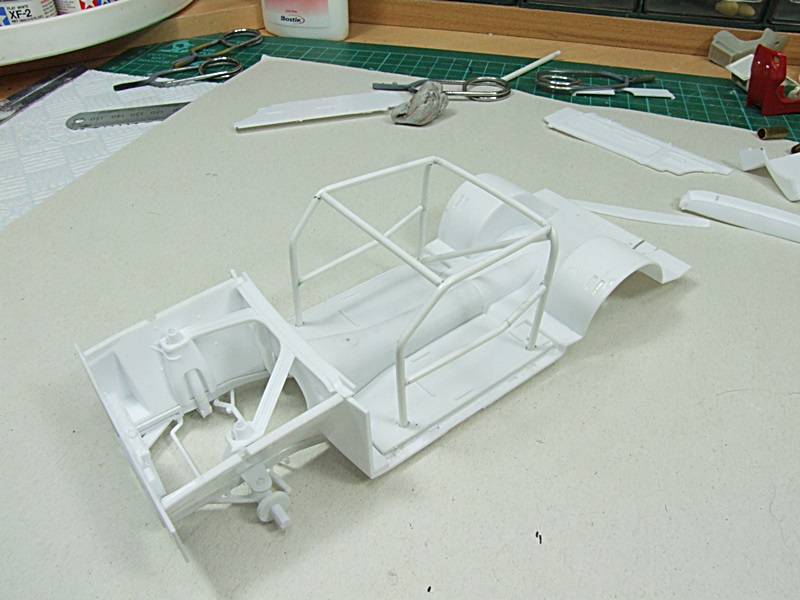
Apart from adding a couple of main hoop to rear of interior braces (done in the same manner) that's it for this one. There are many variations on roll cages and modern ones have a miriad of bars, some curved, some straight. All of thes variations can be scratch built in the manner I describe.
If you are painting the roll cage the same colur as the interior, you can now glue it in permanently. If not, carefully remove it for painting.
For roll cage padding and cable ties see: https://allscalemodelling.forumotion.com/t253-roll-cage-padding-and-cable-ties
Others will have their own opinions, this is just how I do it.
I think the first thing to say is this:
DON'T worry if everything isn't perfectly square. I used to go to great pains to do so but soon realised that once inside a tin top, most slight 'misalignments' are so hard to see, it's just not worth the stress to get them perfect.
And the second thing is, CHECK, CHECK and RE-CHECK at every stage. It's normal for me to have the chassis in and out of the body 4 or 5 dozen times during construction
So here we go.
First I mock up the interior, holding the door cards and dash in place with a little MEK.

Now mark the rear hoop mounting points and drill suitable size holes all the way through the floor.

Next mark the positions of the front points, at the rear of the drill.

Make an adjustment for the drill width and and again drill all the way through the floor. This gives us a footprint from which to build.
At this point I want to show you a little 'bender' I made up years ago. Construction shoud be self explanatory. It is a great aid in bending styrene, particularly in getting the radius's the same.

Now we need to create the main hoop. Cut a length of rod, more than you will need. (Width of the cage plus twice the height, plus about 24mm extra.) Mark the centre point.

Now measure the spacing of the rear set of holes. Do this centre to centre, left side to left side or right side to right side. It doesn't matter. Here you see I'm doing it centre to centre.

Now using the centre mark on the styrene, mark the centre points of the main hoop on the styrene rod.
Now place the rod in the bender. Note I have marked the centre point of the brass tube the better to line up the marks on the styrene.


Now hold the styrene in place and slowly bend past the 90 degree point. Well past it actuualy as it will try to regain it's original shape. Don't worry if it's not quite at 90 degrees.

Then repeat for the other side. That's the tricky bit!! LOL.

Next insert the hoop into the holes pushing it well through the holes.



Now we need to turn our attention to the side bars.
With the body fitted, push a length of styrene through a front hole, making sure you have about 12mm poking through, and mark the bend point as shown. Make the bend at the same angle as the A pillar.

Place the styrene back in the hole and mark the second bend point.

Then make the bend. Repeat for the other side.

Place both back in the holes and mark the hoop attachment points cutting a tad longer than needed.

Now we need to make the 'welded joint'.
Just placing a square cut edge against the hoop, will work, but doesn't look good. We need a curve to the styrene just as in the real deal. To do this I made a little jig from mild steel. Again self explanatory as to contruction I think.

Place one of the side bar ends into the 'jig'. It needs to be the end that butts up against the main hoop. Make sure you have it aligned properly, so the the curve will fit properly to the main hoop.
Keep some pressure on the side bar while filing with the rat tailed file. Work slowly, a little at a time. It's easy to over do it.

It should come out a little like this. DON'T clean up the raggy edges. They will help fill any gap while fixing with MEK. My 'jig' is a bit worn now so this one is a little off centre. Don't worry about it though. It isn't THAT critical.


When you have the side bar finished, fit it into the forward hole and secure to the main hoop with MEK. Repeat for the other side.

Now we need to fit the top forward section. Measure a little long and make the curve at each end as above. Once happy with it, secure with MEK as before.

In the same manner, the main hoop cross brace is made. However, getting the curves and angles is a bit more tricky. They need to be at about 45ish degrees so I usualy do them free hand.
I forgot to take a photo of this step but I have indicated where it fits in this photo. Remember, the upper securing point is on the drivers side.

Now break apart the dash, door card and the cage. If you only used a tiny bit of MEK, this won't be difficult.
Now your cage should look something like this.

Clean up the bottoms of the cage legs and the holes in the floor. Place the cage back in the holes and press down so that about 25mm pokes out the underside of the floor.
Next fit the window glass in place. This is important as it may well affect the final position of the roll cage. Here you can see that this one is of the one piece type and will definitley affect the final height of the cage.

Now fit the chassis/floor to the body with the hoop in place, then push the cage up into the interior until it touches the roof or it's where you want it and mark the length on the underside, as can be seen in the last photo. Cut to length.



When you have made the cuts and are happy with the postition of the hoop, tack it in place with a tiny drop of MEK. Just a tiny bit, as it will need to come out again later.
With the door cards removed we now have easy access for the side impact bars. Pretty simple on this build and done in the same way as the hoop cross brace.


Apart from adding a couple of main hoop to rear of interior braces (done in the same manner) that's it for this one. There are many variations on roll cages and modern ones have a miriad of bars, some curved, some straight. All of thes variations can be scratch built in the manner I describe.
If you are painting the roll cage the same colur as the interior, you can now glue it in permanently. If not, carefully remove it for painting.
For roll cage padding and cable ties see: https://allscalemodelling.forumotion.com/t253-roll-cage-padding-and-cable-ties
 beowulfModerator
beowulfModerator
- Posts : 394
Join date : 2020-03-26
Location : Oop Norf
 Re: My way with roll cages
Re: My way with roll cages
Sat Jul 04, 2020 9:49 pm
very interesting cos i think i could use something like this to make paddock stands for bikes
does not the styrene stretch and thin at the point of bend?
do you think it would work with square section styrene?
does not the styrene stretch and thin at the point of bend?
do you think it would work with square section styrene?
 Al.Admin
Al.Admin
- Posts : 918
Join date : 2020-03-24
Age : 76
Location : Newcastle. N.E England
 Re: My way with roll cages
Re: My way with roll cages
Sun Jul 05, 2020 8:17 am
Paul, if you check out the close up photos of the main hoop, you will find that the styrene rod does indeed turn slightly oval. However this is barely noticiable up to nintey degree bends and even less so at lesser angles.
Yes, it does work with square section rod. You will get a slightly more noticable deformity in the bend but if that bothers you, it can easily be sanded back to square with a sanding stick or sanding block.
HTH
Yes, it does work with square section rod. You will get a slightly more noticable deformity in the bend but if that bothers you, it can easily be sanded back to square with a sanding stick or sanding block.
HTH
 nightflierAdmin
nightflierAdmin
- Posts : 476
Join date : 2020-03-24
Age : 57
Location : Wigan
 Re: My way with roll cages
Re: My way with roll cages
Wed Jul 08, 2020 11:19 am
Great tutorial Al, 

 Webby
Webby- Posts : 123
Join date : 2020-03-28
Age : 65
Location : Strathpine, Australia on a built over WW2 airstrip.
 Re: My way with roll cages
Re: My way with roll cages
Wed Jul 15, 2020 11:38 am
Thanks Al, that's gonna come in handy. For the 'one piece glass' kits I always cut the midsection out. No headroom issues then.
Permissions in this forum:
You cannot reply to topics in this forum


